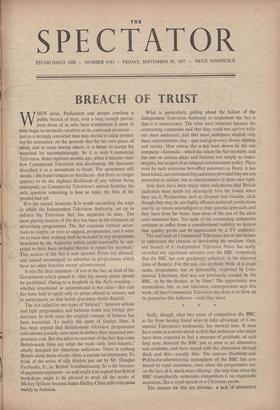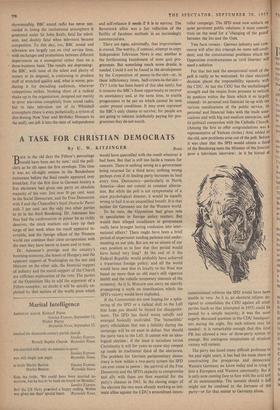BREACH OF TRUST
WHEN press, Parliament and people condone a public breach of trust, over a long enough period, even those of us who have condemned it must in time begin to reconcile ourselves to its continued existence— just as a wrongly convicted man may decide to cease protest- ing his innocence, on the grounds that for his own peace of mind, and to cease boring others, it is better to accept his wretched lot uncomplainingly. So it is With Commercial Television. Some eighteen months ago, when it became clear how Commercial Television was developing, the Spectator described it as , a monument to fraud. The monument still stands—the fraud remains as barefaced—but there no longer appears to be the slightest likelihood of any reform being attempted; on Commercial Television's second birthday the only question remaining is how to make the best of the present bad job.
For the record, however, it is worth recounting the ways in which the Independent Television Authority, set up to enforce the Television Act, has neglected its duty. The most glaring evasion of the Act has been in the extension of advertising programmes. The Act expressly forbade adver- tisers to supply, or even to suggest, programmes, and it went on to insist that 'nothing shall be included in any programme broadcast by the Authority which could reasonably be sup- posed to have been included therein in return for payment.' This section of the Act is now ignored. Firms are allowed, and indeed encouraged, to advertise in programmes which have no other function except advertisement.
It was the clear intention—if not of the Act, at least of the. Government which passed it—that big money prizes should be prohibited. Owing to a loophole in the Act's wording— whether intentional or unintentional is not clear—this rule has been held to apply only to prizes offered to viewers, not to participants, so that lavish give-away shoWs flourish.
The Act called for two types of 'balance': betWeen serious and light programmes; and between home and foreign pro- ductions. In both cases the original concept of balance has been travestied. To justify the spate of foreign films, it has been argued that British-made television programmes sold abroad actually earn more in dollars than imported pro- grammes cost. But this takes no account of the fact that some British-made films are what the trade calls 'mid-Atlantic,' chiefly designed for American audiences. There is nothing British about them except, often, a certain incompetence. To think of the series of silly filmlets put out by Mr. Douglas Fairbanks, Jr., as 'British' is embarrassing. So is the balance- of-payments argument—as well might it be argued that British bookshops ought to be allowed to stock all the works of Mickey Spillane because James Hadley Chase sells even more widely in America. What is particularly galling about the failure of the Independent Television Authority to implement the Act is that it is unnecessary. The reins were loosened because the contracting companies said that they. could not survive with- out mass audiences; and that mass audiences wanted, only basic entertainment slag—quiz and give-away shows, filmlets and variety. How untrue this is has been shown by the one company—Granada—which has taken the Act seriously, and has put on serious plays and features not simply as make- weights, but as part of an integral entertainment policy. Plays even by such notorious box-office poisoners as Ibsen, it has been found, can command big audiences pi-ovided they are not presented as culture, but as entertainment in their own right.
And there have been many other indications that British audiences must needs not necessarily love the lowest when they see it. Productions such as Dragnet and Gunlaw, slick though they may be, are highly efficient technical productions and by no means unintelligent in their general approach; and they have done far better than most of the rest of the alien corn imported here. Yet most of the contracting companies continue to suffer from a constitutional inability to believe that quality goods can be appreciated by a TV audience.
The real fault of Commercial Television lies in this failure to appreciate the chances of developing the medium. Only one branch of it, Independent Television News, has really recorded any significant advance over the BBC (something that the BBC has now grudgingly admitted, in the sincerest form of flattery). For the rest, can anybody think of a single name, programme, star or personality, exploited by Com- mercial Television, that was not previously created by the BBC, or by the theatre, or by films?' The opportunity was tremendous; but, as our television correspondent says this week, all that Commercial Television has done is to blow up its properties like balloons—until they burst.
Sadly, though, after two years of competition the BBC, so far from having found ways to take advantage of Com- mercial Television's weaknesses, has marked time. It must have come as a severe shock to find that audiences who might have been expected to feel a measure of gratitude, of auld lang syne, deserted the BBC just as soon as an alternative was available, and have stayed with the alternative through thick and thin—usually thin. The curious Dimbleby-and- Pickles-for-afternoon-tea atmosphere of the. BBC has con- tinued to repel customers, even when the programmes are, on the face of it, much more alluring : the only time when the BBC triumphantly surmounts competition is on respectable occasions, like a royal speech or a Christmas panto.
The reasons for this are obvious : a lack 'of elementary showmanship. BBC sound radio has never suc- ceeded in losing the institutional atmosphere it generated under Sir John Reith; fatal for televi- sion, and doubly fatal when television became competitive. To this day, too, BBC sound and television are largely run on civil service lines, with exchanges and promotions between different departments on a managerial rather than on a show-business basis. The results are depressing : the BBC, with most of the talent and plenty of money at its disposal, is continuing to produce stuff of wretched quality and, what is worse, pro- ducing it for dwindling audiences, wherever competition strikes. Nothing short of a radical shake-up in the organisation, designed not merely to sever television completely from sound radio, but to take television out of its Whitehall atmosphere (there is even, pathetically, a system of distributing New Year and Birthday Honours to the staff), can jolt it into the state of independence and self-reliance it needs if it is to survive. The Baverstock affair was a fair reflection of the futility of Jacobian methods in an increasingly commercial era.
There are signs, admittedly, that improvement is craved. The worthy, if comical, attempt to copy Independent Television News is one; another is the forthcoming banishment of most quiz pro- grammes. But something much more drastic is needed. Could it not be found in the development by the Corporation of penny-in-the-slot--or, in these inflationary times, half-crown-in-the-slot- TV? Little has been heard of this idea lately, but it remains the BBC's finest opportunity to recover its ascendancy and, at the same time, to enable programmes to be put on which cannot be seen under present conditions. It may even represent the BBC's only chance to survive; for people are not going to tolerate indefinitely paying for pro- grammes they do not watch.































 Previous page
Previous page